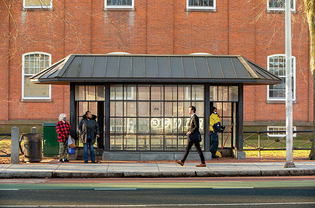
Bob Handelman
A bus stop on the New Haven Green.
View full image
The ongoing afterlife of slavery
We have to remember that we are living inside a much longer, older story than the one we experience at Yale today. It is the story of a certain kind of intellectual enlightenment, and that story of enlightenment is tied to a story of terror and enslavement. The challenge is to see both stories as something we’re working within. To use a theological term, we’re engaged in a kind of exorcism. We’re seeking to exorcise the demons that have lurked inside the greed and the theft that originally made the university possible. We’re seeking to understand both the theft and the gift that have been woven together: the stealing from and the offering to. In so many universities, and so much of education in this country, we do really well at honoring the gift of education. We don’t do very well at understanding the theft.
How might we take both gift and theft and allow ourselves to think deeply, ethically, and morally at the very center of both—such that we don’t live in the illusion that it’s all a triumphal gift, but rather we listen to the screams and the cries of those who suffer today? Those, for example, who feel the injustice of a criminal justice system that remains calibrated by the logic of slavery and the era of Reconstruction to treat Black and brown people as threats that must be controlled. That logic shows itself in a prison system that refuses restorative policies and practices and glories in punishment that borders on torture. That torture continues for the formerly incarcerated as they return to a society that has hollowed out their citizenship, keeping them from voting, holding public office, gaining meaningful employment, getting loans, and a whole host of other rights necessary to be made whole again. Their pain must be heard today.
The way to do that is to turn the gift of education, and with it reason, thinking, enlightenment, freedom, and speech, toward rectifying what was taken with theft. There is a danger of not taking slavery seriously as a crucial part of the intellectual work across the university—whether one is in history or calculus, in religion or chemistry. Thinking seriously about the ongoing afterlife of slavery, the disparagement and the poverty, is crucial to all our intellectual work. The accumulation of wealth for those who enslaved, and the denial of the opportunity to accumulate wealth for the enslaved and their freed children, mark two distinct trajectories of living that flow right into our moment and into the lives of all who inhabit universities.
Those trajectories brought with them not simply uneven development, but also developments in how we see or do not see the histories we and our scholarly work inhabit, and how we understand or do not understand our responsibilities in relation to that history. Either we do our work in the academy sustaining the trajectories of living that flow from the outrageous accumulations of wealth born of slavery, or we engage in scholarship and teaching that redirect those trajectories toward a meaningful reparation that restores to the university an authentic partnership with all those seeking justice.
What Yale needs to do—quickly, clearly, and immediately—is to make New Haven a full and complete collaborator, a partner in the work. For too long, it’s been obvious that at Yale, as at so many other universities, the vision of what the school is about has not included the very place that it’s in. And so its moral footprint has not been at all shaped by that place.
There is really no future in deepening what we have to do without making the City of New Haven not merely a place that needs to be “managed,” but rather a partner in the work. We must allow the city to help shape the direction of the university. Across the country, almost every university treats its city as though the city serves it, instead of treating it as a conversational, an intellectual, and a moral partner.
It’s time we stopped treating New Haven as though New Haven were the backdrop for Yale. New Haven and Yale are one project. Until Yale starts to see New Haven as a shared project of education and the kind of work we want to do in this world, we will continue to recreate the very dynamic that was born of slavery and has lived in its aftermath.
Willie Jennings is associate professor of systematic theology and Africana studies at the Divinity School.
 loading
loading